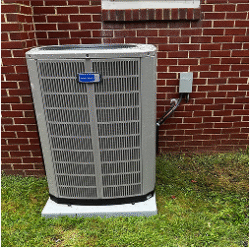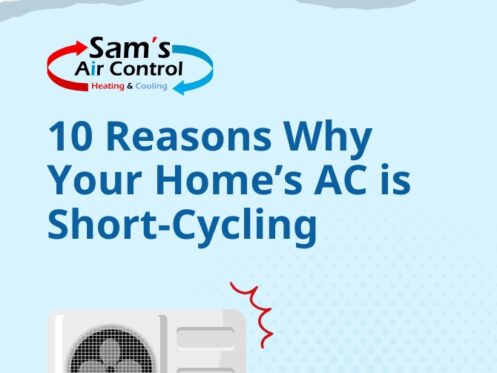If your air conditioner keeps turning on and off frequently in your Metuchen, NJ, area home, it’s undergoing an issue called short cycling. This can interfere with your comfort, lead to increased energy bills, and potentially damage your AC unit. The experts at Sam’s Air Control Heating & Cooling have a list of 10 reasons why your home’s air conditioner is short-cycling. Understanding the underlying causes of why this occurs can help you save money and maintain indoor comfort during the hot summer months.
What Is AC Short Cycling?
AC short cycling occurs when your AC keeps turning on and off rapidly without ever finishing a complete cooling cycle. A typical cycle is 10–20 minutes long, while short cycling is less than 10 minutes or even 5 minutes.
You shouldn’t ignore short cycling because it prevents your air conditioner from cooling your home effectively, leading to increased energy consumption, higher energy bills, and an increased need for repairs on the unit.
Top Causes Why Your AC Keeps Turning On and Off
Here are the 10 most common AC short-cycling causes that homeowners face.

1. Dirty or clogged air filters
A dirty or clogged air filter is one of the most common causes of AC short-cycling. When your filter is clogged, the airflow is restricted, making it difficult for the AC to circulate air. This blockage ultimately forces your air conditioner to work harder to reach the desired temperature, potentially leading to short cycling and excessive wear on essential components.
If your air filter is dirty, we recommend replacing it with a new one, as this is a critical part of preventive maintenance. You may also contact the HVAC technicians at Sam’s Air Control to schedule a filter inspection and replacement. The technician may clean the area and look for issues that cause poor airflow, such as blocked ducts or dirty coils.
2. Refrigerant leaks and low levels
A refrigerant leak or low refrigerant levels is another common cause of AC short-cycling because refrigerant is responsible for absorbing heat from your home and transferring it outside. This causes the unit to turn on and off frequently as it continually tries to reach the set temperature, putting excessive strain on the compressor and leading to system damage.
3. Oversized air conditioning unit
When it comes to air conditioning units, size matters. If your AC unit is too large for your home, it will cool the space too quickly, shut off prematurely, and then restart. The short cycling means the unit won’t run long enough to properly dehumidify the air, leaving your home feeling extremely humid and uncomfortable.
Contact a professional to perform a load calculation to determine the best unit size for your home. If your current unit is too large, you may need to replace it with a new AC more suited to your house’s overall size and cooling needs.
4. Electrical problems and faulty wiring
Issues such as damaged wires, malfunctioning electrical components, or loose connections can cause short cycling. This occurs because the electrical flow required for your AC to operate is interrupted or damaged. As a result, the system could begin short-cycling.
Electrical issues reduce efficiency and pose a safety hazard, including the risk of an electrical fire. Other damaged electrical components, like a failing compressor motor or a faulty contactor, can also lead to short cycling.
5. Malfunctioning thermostat
A malfunctioning thermostat may misread the indoor temperature or fail to maintain the set temperature, resulting in short cycling of the heating or cooling system. Some common causes of malfunctioning thermostats include loose wiring, a dead battery, improper placement, or the need for the thermostat to be calibrated. Older thermostats may also not be as accurate as newer models. A Sam’s Air HVAC technician will resolve the issue by testing the thermostat and, as necessary, rewiring, recalibrating, or replacing it.
6. Blocked or restricted airflow
Restricted airflow causes your air conditioner to struggle with moving cooled air, forcing it to work harder and potentially leading to overheating and short cycling. Closed registers, blocked vents, and dirty air filters are common causes of restricted airflow. Aside from changing the air filter, ensure that nothing obstructs your vents and registers, such as furniture or curtains.
A leak, blockage, or improperly sized ductwork is another common cause of restricted airflow. If you suspect that your AC has airflow issues, our HVAC technicians will diagnose the problem by inspecting your system and addressing blockages.
7. Improper thermostat placement
Although this issue is not as well-known, improper thermostat placement may contribute to AC short-cycling. If your thermostat is located near a heat source, such as an appliance or a sunny window, it may incorrectly register the indoor temperature, causing your AC to cycle on and off prematurely.
Thermostats installed in a small room with a supply vent but no return vent may also heat up or cool down too quickly, causing your AC to shut off before the entire home reaches the desired temperature. An experienced HVAC technician can determine if this is the cause and then relocate and reinstall your thermostat in a more suitable location.
8. Frozen evaporator coils
If your evaporator coils become frozen, the AC can’t efficiently transfer the heat out of your home. In turn, it starts working overtime by cycling on and off as frequently as possible to maintain your desired temperature. An HVAC professional can quickly determine the cause of your frozen coils and take steps to get your system up and running.
9. Shortage of return air vents
Return air vents are critical to the cooling process because they allow warm air from your home to circulate back to the AC system for cooling. The unit won’t function correctly if the return air vents are insufficient, blocked, or sized improperly. An HVAC technician will assess your return air vents and may install additional vents or adjust your existing ones to ensure optimal airflow. This should improve the airflow and air quality inside your home, thereby preventing short cycling.
10. Faulty or worn-out compressor
Compressor issues can cause short cycling, as it’s responsible for distributing refrigerant throughout the system. Common compressor issues include mechanical failures, electrical problems, and wear and tear, which can render the compressor unable to maintain correct pressure levels. A faulty contactor or capacitor can also lead to compressor failure. Low refrigerant levels may cause the compressor to overheat and shut down. An HVAC technician will inspect the compressor and run a pressure test to diagnose the issue.
Call Sam’s Air Control Today!
If you’re dealing with AC short-cycling in your Metuchen, NJ, area home, Sam’s Air Control Heating & Cooling can help. Whether it’s airflow issues, frozen coils, or a failing compressor, we’ll inspect and repair the problem to keep you comfortable. To schedule AC repair or a tune-up, contact us today!
Frequently Asked Questions
Can a dirty filter cause my AC to short-cycle?
Yes, a dirty air filter can cause your air conditioner to short-cycle, especially if it’s clogged. This restricts airflow, causing the AC unit to work harder to cool your home, which can lead to overheating and short cycling.
How do I stop my AC from short-cycling?
To prevent your AC from short-cycling, clean or replace the air filter, ensure the vents are open and free of blockages, and verify that your thermostat is functioning properly. If the unit is still short-cycling, call Sam’s Air Control to schedule an inspection, diagnosis, and repair.
Will I need a new AC unit if it keeps turning on and off?
Short cycling doesn’t always mean that you need a new AC unit. In some cases, it could be a matter of recalibrating the thermostat, changing the air filter, or repairing or replacing certain components. If your AC is 10 years old or older and you’re paying for frequent repairs, it could be more cost-effective to purchase a new one.


